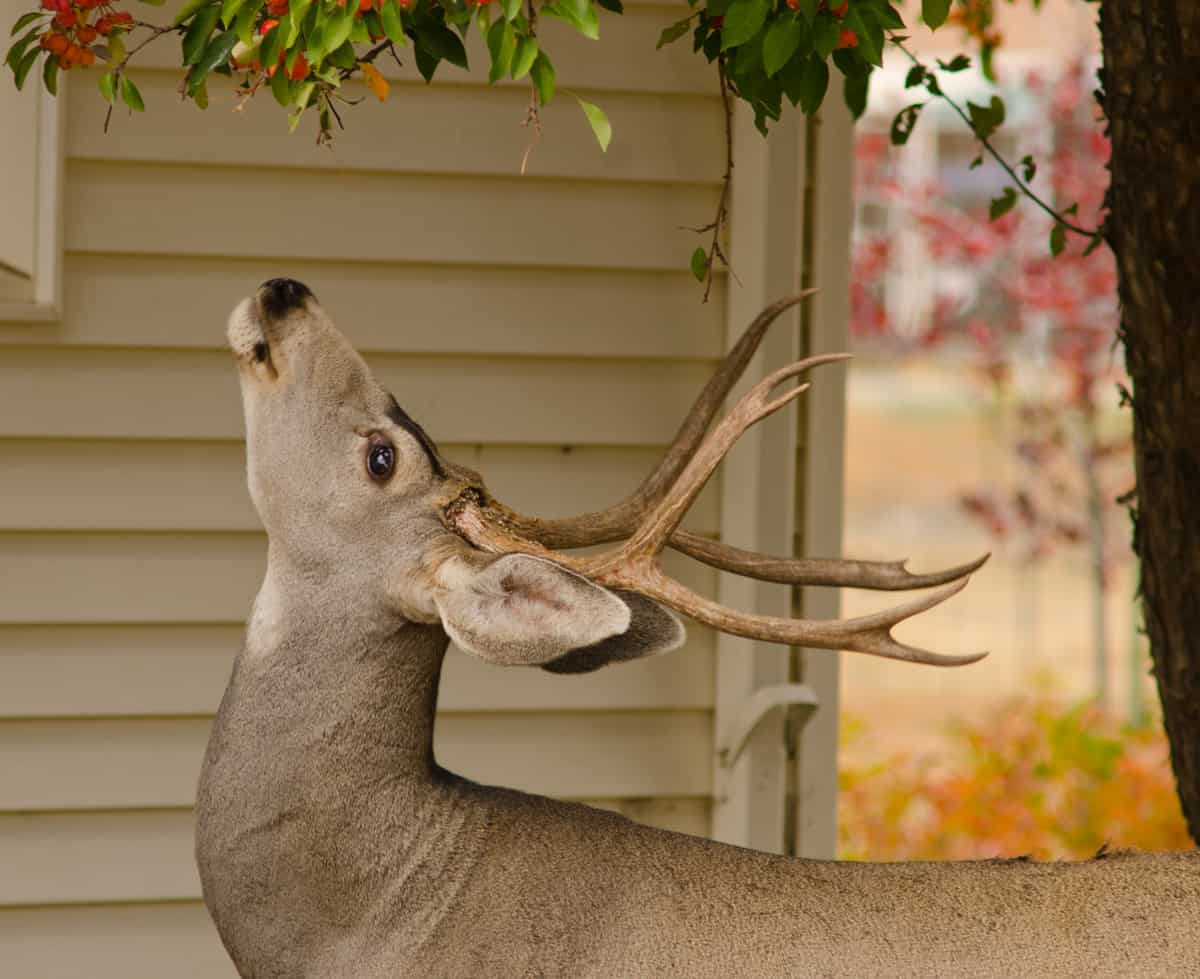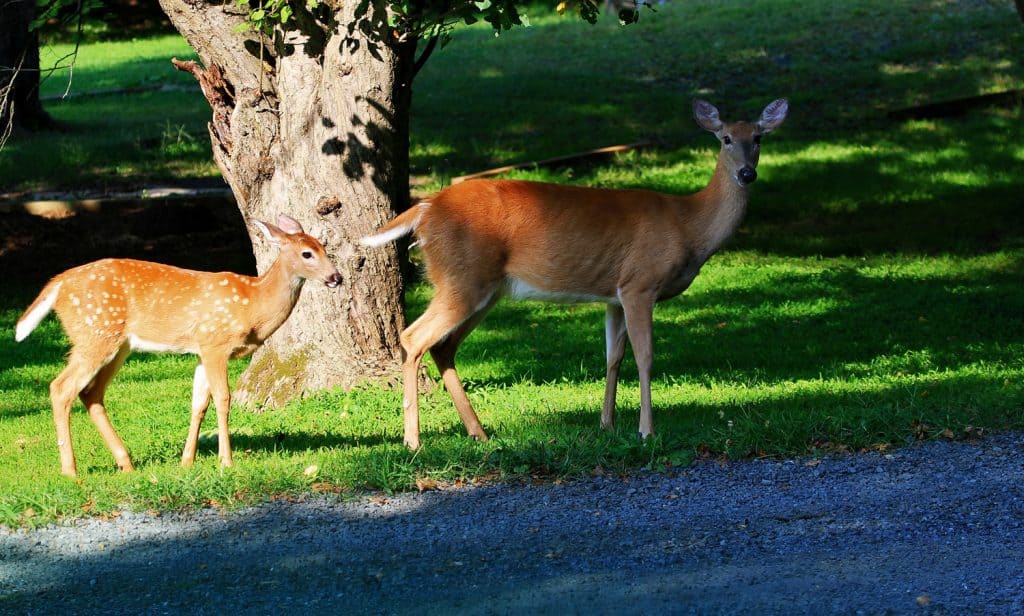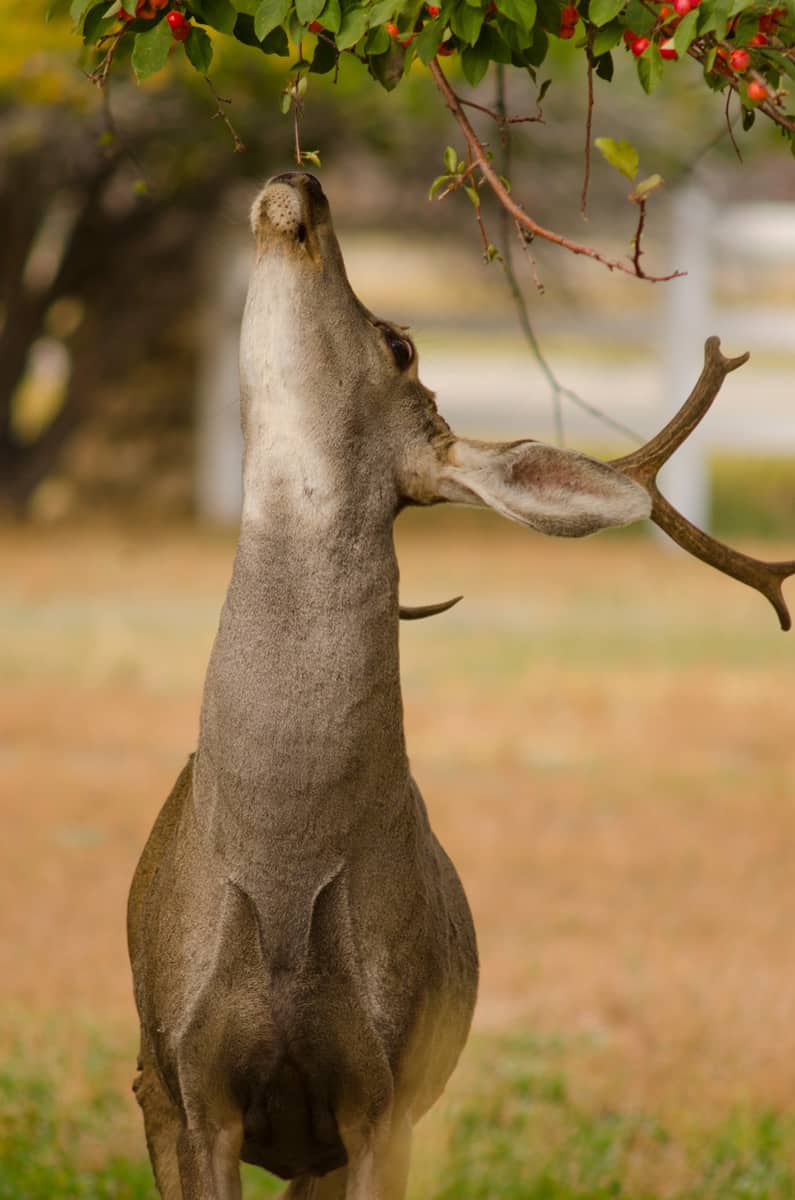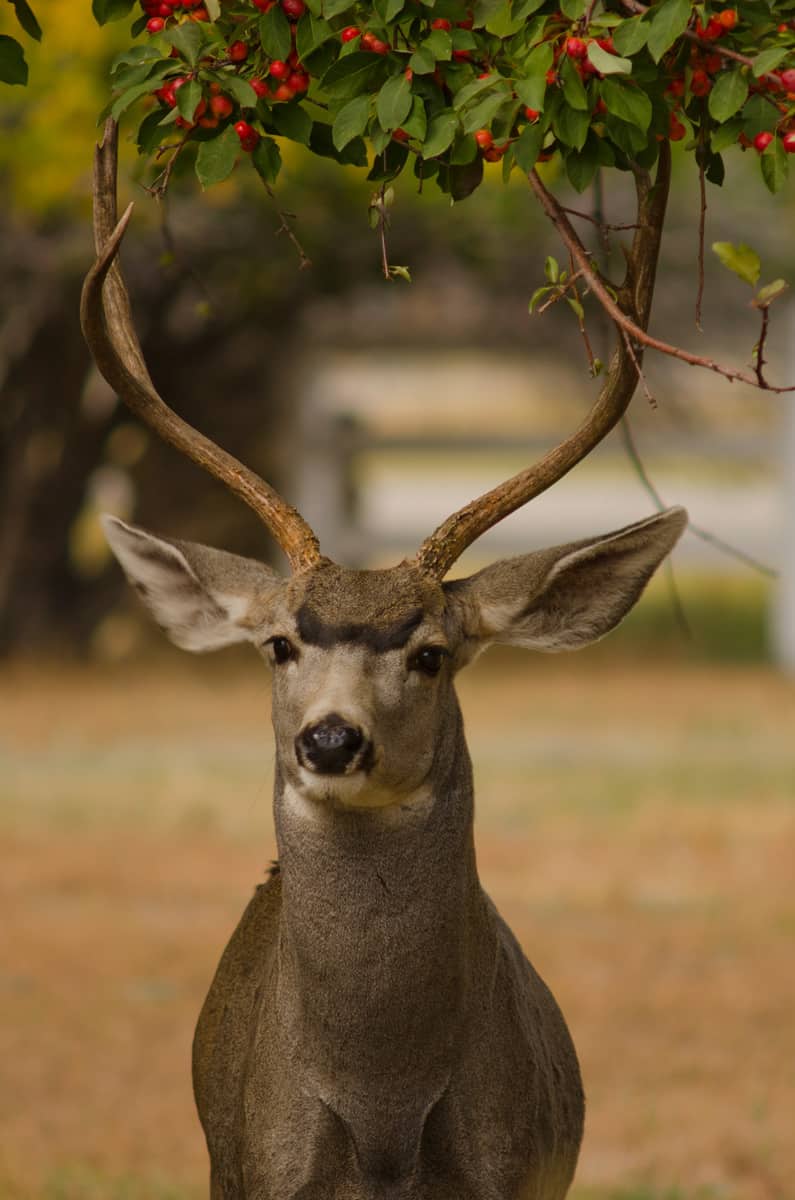Crabapple trees are beautiful, versatile, and make for gorgeous decorative plants in both front yards and the backyard. Unfortunately, deer are popular pests in home gardens and are known for being quite fond of fruit trees. But do they like crabapple trees? Or are these trees deer resistant? We've researched this question, and we'll discuss the answer in detail.
Unfortunately, no. Most crabapple trees are not resistant to being munched on by local deer. Deer love fruit trees, and the smell of these small trees can lure hungry deer from several yards. This is especially true if you live in an area of plush grass and tall trees--areas where deer are known to feed and hide out from predators.
Like other fruit trees, deer love crabapple trees, and they are tall enough to reach the branches of the tree and can cause significant damage to them. However, some tree varieties are deer-resistant, such as the Prairiefire crabapple tree. This hearty variety has very tiny apples, and they tend to be a bit more bitter and hardier than other varieties, which is a turn-off to deer.
If you live in an area that's prevalent with deer, it helps to know which preventive methods to use to keep the deer away from your trees or garden. There are several methods to choose from, and the best one will depend on your budget and personal preference. Continue reading to learn what options are available.
![A mature mule deer buck, Odocoileus hemionus, watches the photographer as he turns his head preparing to eat the crabapples above his antlers featured, Are Crabapple Trees Deer Resistant? [With Tips On How To Protect Them]](https://gardentabs.com/wp-content/uploads/2021/08/Are-Crabapple-Trees-Deer-Resistant-With-Tips-On-How-To-Protect-Them.png)
Deer and Crabapple Trees
Deer will regularly consume the crabapples from your orchard if you don't take precautions to deter them. The scent and hardness of fruits such as apples, pears, blueberries, mulberry, and plums make them desirable by different types of deer, including Whitetail, Elk, and Mule Deer.
The height, long tongue, and narrow snout on these deer allow them to easily pick out specific parts of the plant, such as the fruit. Though some varieties may be too bitter for the deer, many will be perfect for deer looking to stock up on meals before the rut.
Methods to Keep Deer Away From Your Crabapple Trees

You'll be happy to learn that there are a ton of ways that you can keep deer away from your crabapple tree. You don't have to worry about harming the deer with these methods, and many of them are simple and inexpensive to do. Let's take a look.
Erect a fence
Erecting a fence is one of the most effective methods to deter deer from your crabapple trees. You can use an electric fence or a non-electric one. Bear in mind that the electric fence will not harm the deer. It'll just give them a slight jolt, preventing them from trying to make their way into your orchard.
You can purchase all of the materials at a local home improvement store and build a fence for less than $200. It's best to make it at least 8-foot tall. Deer are known to be notoriously high jumpers and 8 feet is typically the minimum height for an effective fence.
Surround the trees with deer-resistant plants
Deer are lead to feeding areas by their nose. So, if you find a way to repulse them, you won't have to worry about them munching on your crabapple trees. One of the best ways to do that is to plant a barrier of deer-resistant plants around your crabapple trees. The odor from these plants will naturally turn off the deer. And for a few of these plants, the thorns and other annoying textures will also help keep deer away.
Here are a few plants that you can use:
- African Lily
- Agastache
- Alchemilla
- Mint
- Lavender
- Fountain Grass
- Rosemary
- Crape Myrtle
- Perovskia
- Cardoon
- Foxglove

Install motion-activated lights and sprinklers
Consider installing motion-activated devices in your yard. Deer are notoriously skittish, and an underground sprinkler system or bright lights can deter them from coming too close to your crabapple trees.
You can even find some sprinkler systems that emit a loud sound to help scare the deer away. These systems are fairly easy to set up and can be purchased anywhere from $40 to $70 online or at your local gardening store.
Read more details about the sprinkler system on Amazon.
Add hills and barriers
Making your orchard harder to reach can also keep deer away. If you have hills and levels in your yard, deer will think twice about the effort that it will take to reach the crabapple trees. Yards that seem too difficult to navigate will be a turn-off, as deer don't fare well when it comes to climbing slopes or steep hills.
There are several ways that you can do this. You can add stacks of chopped wood to build small hills or create sunken beds to keep the deer from your trees.
Get a guard dog
Being that deer are always on the lookout for predators and hunters, an alert and barking dog will work as a great deterrent to keep them away. Even if you have a small dog, let it run around the orchard every so often to keep an eye on things. Dogs work as great alarm systems to alert you when deer and other tree-munching wildlife are present in your garden.
Plant tall hedges
You can also use tall hedges to create a border around your crabapple trees. Lining your orchard or garden with these hedges will prevent the deer from being able to peer inside to see where the trees are located.
Keep in mind that the hedges should at least be 5 to 6 ft tall to be effective. It's also worth mentioning that the hedges will require maintenance every month so that they stay full and able to block the view into your orchard.
Use deer repellent
There are a few different quality deer repellents that you can purchase at local hardware stores or online. Products such as Deer Off, Deer Out, and Liquid Fence can work very effectively at keeping deer away from your crabapple trees. These repellents work by emitting a very peculiar odor that completely deters deer and other wildlife from the area.
The odor is reminiscent of a decaying animal carcass--so yes, it's an effective deterrent for herbivores. Also, the repellent tastes similar to garlic and onions, which makes it particularly unappealing to deer. Deer Off has actually been shown in studies to reduce garden deer populations by 50 to 75%.
Read more details about Deer Out on Amazon.
Plant homemade deer repellents around the trees
As mentioned earlier, deer are especially sensitive to smell. To keep them away, consider planting and hanging plants and other items that turn them off to the allure of your crabapples. This includes placing garlic, hot pepper sprays, vinegar, ammonia-soaked rags, cayenne pepper, blood meal, and onions around your trees.
You can also take it a step further and create a large perimeter around the entire orchard. Place these homemade solutions in milk bags or plastic trash bags with small holes punched in them. Sometimes, it'll take a little trial and error to determine what will work best for maximum efficiency. But don't worry, you're likely to figure out something pretty quickly.
Check out these milk bags on Amazon.

Do Windchimes Scare Deer?
Yes. Windchimes can be an effective way to keep deer away from your yard. Remember, deer are naturally skittish (even older deer), and even the slightest unexpected sound can startle them enough to turn them away. Most deer species can hear anywhere between 4 to 8 kilohertz, and anything that disrupts the natural serenity of your orchard will alert them.
This means that even a slight wind can easily shake the chimes, sending deer running far away from your location. Consider installing the chimes around the border of your orchard or near each tree.
Do Coffee Grounds Scare Deer Away?
Yes, the strong smell of coffee can deter deer from your garden. It won't necessarily scare them, but it can be an effective deterrent if you have a deer issue. For this method, consider placing a milk bag full of used coffee grounds near your plants or trees to keep deer away.
Does Vinegar Repel Deer?
Yes. You'll be pressed to find an animal (other than scavengers such as raccoons and possums) that's not turned off by the strong smell of vinegar. Deer are no different. Lining the perimeter of your orchard with vinegar-soaked rags can help to keep deer and other wildlife garden pests away. Bear in mind that you may need to replace the bags every 7 to 10 days.
Find distilled vinegar on Amazon.
Wrapping Things Up

Unfortunately, like other fruit trees, crabapple trees can be susceptible to feeding frenzies by local deer. Some of the best methods to prevent this include building a fence around your trees or orchard, placing deterrent plants and other strong-smelling items nearby, and making your orchards hard to access with uneven levels and narrow passages.
If you want more information on crabapple trees, follow these links below:
How Long Does A Crabapple Tree Live?




